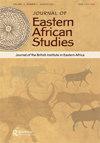赞比亚2021年选举中的城市投票:铜带和卢萨卡对经济的普遍态度
IF 0.6
3区 社会学
Q2 AREA STUDIES
引用次数: 3
摘要
摘要本文分析了Afrobarometer的调查数据,以了解执政党大本营居民对赞比亚经济的普遍态度。爱国阵线(PF)从2006年到2016年在城市省份赢得了最多的选票,但在2021年输给了反对派,同时在其农村基础上保持了多数席位。从历史上看,每当赞比亚发生选举更替时,反对党都会在城市地区赢得最多的选票,这表明了城市选票的重要性。这篇文章中提供的证据表明,铜带和卢萨卡这两个城市省份的受访者与他们在爱国阵线农村据点的同胞相比,受教育程度更高,获得基本服务的机会更多,获得信息的机会更高。虽然城市和农村居民都对政府处理经济的方式感到不满,但爱国阵线的城市基础更有可能在投票中惩罚执政党。根据非洲城市投票的调查证据和文献,本文表明,城市和农村地区不同的地理、社会和经济特征产生了不同的不满,这对政策预期、政治动员以及选民如何评价候选人都有影响。本文章由计算机程序翻译,如有差异,请以英文原文为准。
The urban vote in Zambia’s 2021 elections: popular attitudes towards the economy in Copperbelt and Lusaka
ABSTRACT
This article analyses Afrobarometer survey data to understand popular attitudes toward the economy of Zambia amongst residents in the ruling party strongholds. The Patriotic Front (PF) won the most votes in urban provinces from 2006 to 2016 but crucially lost to the opposition in 2021 while retaining majorities in its rural base. Historically, opposition parties have won the most votes in urban regions on every occasion that Zambia has experienced an electoral turnover, demonstrating the significance of the urban vote. The evidence presented in this article reveals that respondents in the two urban provinces, Copperbelt and Lusaka, were better educated, had more access to essential services, and had higher levels of access to Information relative to their compatriots in the PF’s rural strongholds. While both urban and rural residents were dissatisfied with the government’s handling of the economy, the PF’s urban base was more likely to punish the ruling party at the polls. Drawing on survey evidence and literature on voting in urban Africa, this article shows that the divergent geographic, social, and economic characteristics of urban and rural areas produce distinct grievances which have implications for policy expectations, political mobilization, and how voters evaluate candidates.
求助全文
通过发布文献求助,成功后即可免费获取论文全文。
去求助
来源期刊

Journal of Eastern African Studies
AREA STUDIES-
CiteScore
3.30
自引率
7.10%
发文量
12
期刊介绍:
Journal of Eastern African Studies is an international publication of the British Institute in Eastern Africa, published four times each year. It aims to promote fresh scholarly enquiry on the region from within the humanities and the social sciences, and to encourage work that communicates across disciplinary boundaries. It seeks to foster inter-disciplinary analysis, strong comparative perspectives, and research employing the most significant theoretical or methodological approaches for the region.
 求助内容:
求助内容: 应助结果提醒方式:
应助结果提醒方式:


